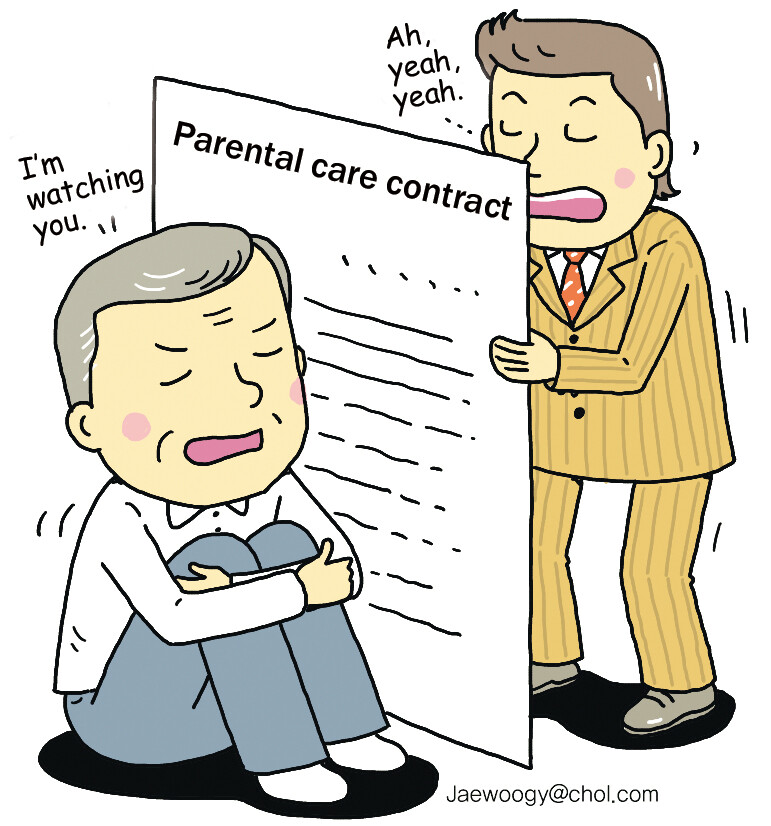hankyoreh
Links to other country sites 다른 나라 사이트 링크
“Parental care contracts” increasingly common in South Korea

A 56-year-old father surnamed Kim first heard about “parental care contracts” last month while attending an alumni meeting. The principle was simple: he would leave his fortune to his children on the condition that they observe their hyodo, or the filial duty to care for their parents. If they didn’t, the inheritance would be taken back.
Kim and his wife, whose son is about to get married, were planning to give him their retirement savings of 200 million won (US$171,000) to use as a key money deposit for an apartment. But they were concerned about the lack of a suitable income source once the father left his job. The son promised to send them money each month to cover living expenses, but the Kims weren’t sure their daughter-in-law would live up to the bargain. After giving the matter some thought, Kim went see a lawyer early this month at his friend’s advice.
More and more people like Kim have been turning to lawyers recently for advice on parental care contracts.
“It’s not so much the wealthier parents, but mostly middle-class parents who own a single residence,” explained attorney Jang Jin-yeong. “Their children are saying, ‘Help us out with your seed money and we’ll take care of you for the rest of your life,’ and they want to know what they should do.”
According to Supreme Court statistics, the number of lawsuits filed by struggling parents to demand payment of living expenses from their children roughly doubled from 127 in 2003 to 250 in 2013.
In a recent ruling, the Supreme Court said that children who receive property from their parents on the condition that they support them are obliged to return it if they don’t honor the promise. In Dec. 2003, a parent surnamed Yu gave his son a two-story home in Seoul, provided that the latter meet his filial obligation. The son wrote a pledge in which he promised to live with his father and “faithfully support” his parents.
“I will not challenge any dissolution of the contract or other measures taken in response to failure to honor [the pledge],” he wrote at the time.
But the son’s attitude changed once he received the assets. While the parents continued living on the second floor and the son on the first, he rarely visited them. He also suggested putting his ailing mother in a nursing home. In response, the parents demanded the property back; the son refused.
The court ruled that because the parents had given the son the property “conditionally” on the promise to perform his duty, as opposed to a simple gift, the contract that had not been honored should be declared null and void.
Experts are now saying that parental care contracts like the Yus’ are the only way to guarantee children will continue to care for their parents after such a gift. Once parents hand over their assets on a promise from the children to honor a major commitment, they have no means of recovering them if the promise goes unkept. They can, however, retrieve their assets when the children are found to have failed to honor the terms of a “conditional gift.” In such cases, they would have to write out the specific terms of the commitment in the contract and stipulate explicitly that any property received would have to be returned if they are not met.
The terms should also not be excessively onerous relative to the value of the gift.
“Without a contract, [parents] have no way of proving [the children agreed to the terms] if the children feign ignorance after the gift,” said attorney Kim Yong-il of the law firm Gilsang.
“Instead of just receiving an oral commitment to honor filial duties, it’s important to stipulate those conditions in writing in a contract,” Kim advised.
By Seo Young-ji, staff reporter
Please direct questions or comments to [english@hani.co.kr]

Editorial・opinion
![[Column] Season 2 of special prosecutor probe may be coming to Korea soon [Column] Season 2 of special prosecutor probe may be coming to Korea soon](https://flexible.img.hani.co.kr/flexible/normal/500/300/imgdb/original/2024/0426/3317141030699447.jpg) [Column] Season 2 of special prosecutor probe may be coming to Korea soon
[Column] Season 2 of special prosecutor probe may be coming to Korea soon![[Column] Park Geun-hye déjà vu in Yoon Suk-yeol [Column] Park Geun-hye déjà vu in Yoon Suk-yeol](https://flexible.img.hani.co.kr/flexible/normal/500/300/imgdb/original/2024/0424/651713945113788.jpg) [Column] Park Geun-hye déjà vu in Yoon Suk-yeol
[Column] Park Geun-hye déjà vu in Yoon Suk-yeol- [Editorial] New weight of N. Korea’s nuclear threats makes dialogue all the more urgent
- [Guest essay] The real reason Korea’s new right wants to dub Rhee a founding father
- [Column] ‘Choson’: Is it time we start referring to N. Korea in its own terms?
- [Editorial] Japan’s rewriting of history with Korea has gone too far
- [Column] The president’s questionable capacity for dialogue
- [Column] Are chaebol firms just pizza pies for families to divvy up as they please?
- [Column] Has Korea, too, crossed the Rubicon on China?
- [Correspondent’s column] In Japan’s alliance with US, echoes of its past alliances with UK
Most viewed articles
- 1Samsung subcontractor worker commits suicide from work stress
- 2‘We must say no’: Seoul defense chief on Korean, USFK involvement in hypothetical Taiwan crisis
- 3[Editorial] Korea’s surprise Q1 growth requires objective assessment, not blind fanfare
- 4No good, very bad game for Korea puts it out of Olympics for first time since 1988
- 5Division commander ordered troops to enter raging flood waters before Marine died, survivor says
- 6N. Korean delegation’s trip to Iran shows how Pyongyang is leveraging ties with Moscow
- 7Korea’s 1.3% growth in Q1 signals ‘textbook’ return to growth, says government
- 8US overtakes China as Korea’s top export market, prompting trade sanction jitters
- 9[Column] Park Geun-hye déjà vu in Yoon Suk-yeol
- 10[Column] Season 2 of special prosecutor probe may be coming to Korea soon